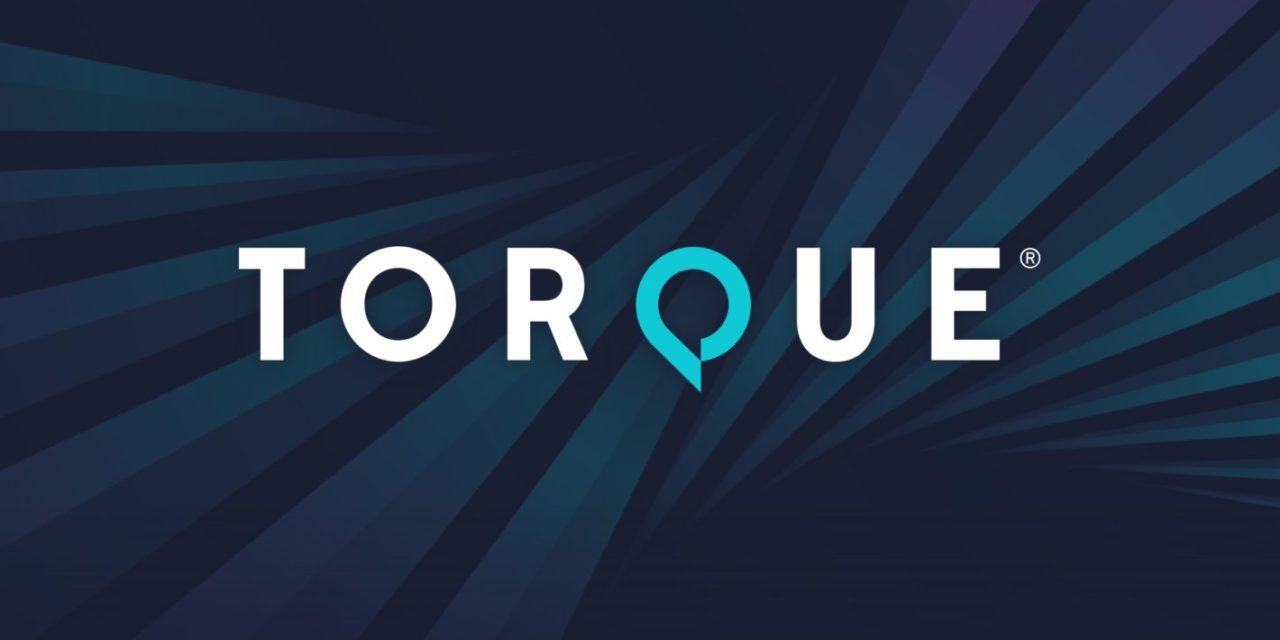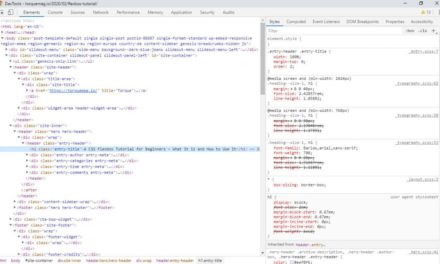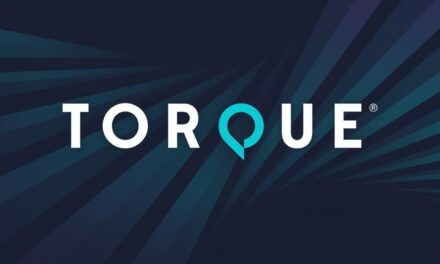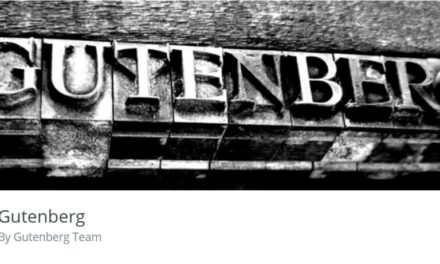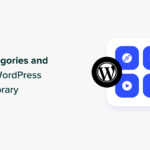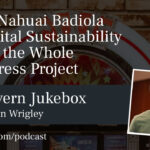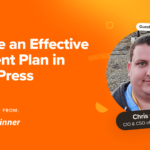Welcome to Press This, the WordPress community podcast from WMR. Here host David Vogelpohl sits down with guests from around the community to talk about the biggest issues facing WordPress developers. The following is a transcription of the original recording.
Powered by RedCircle
David Vogelpohl: Hello everyone and welcome to Press This, the WordPress community podcast on WMR. This is your host, David Vogelpohl. I support the WordPress community through my role at WP Engine, and I love to bring the best of the community to you here every week on Press This. As a reminder, you can follow me on Twitter @wpdavidv, and you can subscribe to Press This on Red Circle, iTunes, Spotify, or download the latest episodes at wmr.fm. In this episode we’re going to be covering something really special we’re going to be recovering why Troy Dean of agency Mavericks just quit as CEO and why you should quit as CEO too. If you’re running your own company particularly a freelancer or an agency business should I say maybe you have another type of business in the WordPress space. I know a lot of the people who listen to the show, run agencies and work with an agency contacts. I think it’s really interesting to think about how Troy has been approaching his role within the company and kind of this notion of quitting as CEO. So I just want to start by welcoming Troy to the show. Troy welcome to Press This.
Troy Dean: Thanks, David. Thanks for having me. It’s always a pleasure to hang out and chat with you my friend.
DV: Absolutely. We’ve had you on the show in the past and I always love to hear about what you have going on. We really appreciate you coming back especially at this kind of key moment and how you’re thinking about your business differently. But for those unfamiliar, Troy is from the very popular agency Mavericks, really focusing on agency business optimization and there’s a lot more to it. than that. I’ll ask you about that later dry. But he’s going to cover why he recently quit his CEO role or company he founded the benefits he expects in doing so and what he’s going to focus on instead and finally, why he thinks many agency owners should seriously considering quitting their role as CEO which I think is really interesting, is a former owner operators CEO of an agency. myself too, right. So let’s start though with the same question I asked every guest, could you briefly tell me your WordPress origin story?
TD: Yes, so I had this gig once on a tropical island here in Australia called Greg Capullo island where I was playing I was a gigging musician. I was playing like six gigs a week on the resort playing covers, you know the classics brand idea by Van Morrison and I believe we were the Monkees and getting everyone up to dance. And during the day, I decided to teach myself how to build websites because I was kind of bored. And I was really at an inflection point in my life where I was a gigging musician and voiceover artists, but the kind of always waiting for the phone to ring when you do that kind of work. You haven’t got a lot of control over your own income. So I thought, You know what, I’m going to scale up and build a few websites to promote myself as a musician and I thought I’m going to scale up and actually figure out how to do this properly. And so I wrote my own content management system in Notepad Plus on a Sony VAIO laptop and learn how to write PHP and MySQL, HTML and CSS. And it was an amazing experience. And then I came back to the mainland and was talking to a friend of mine, who, who was the only other web designer I knew, and I kept asking him, Hey, how do you do that thing where you get where you can like get multiple images to upload to a media library at the same time, that is back in 2007. Right. So there’s a long time ago before JavaScript libraries were really popular. And I was like, how do you how do you get multiple images to upload at the same time? And he’s like, I don’t know, I just use WordPress. And I kept asking him all these questions and he’s answered it, everything was I don’t know, I just use WordPress and I’m like, Alright, I’m gonna go home and figure out download this WordPress thing and figure it out. And so I downloaded a bunch of different services at the time. And WordPress, despite the fact that they’re famous five minute installation to be probably three days. It was the one that I managed to get up and running and start using and all the others I downloaded, I had no idea how to login or use them so that I just kind of put them in the trash. And so this was 2007 and I kind of got into WordPress and realized that I just spent six weeks building something that now I can probably turn around in a couple of hours using WordPress and that was like, I felt like the clouds had parted. And someone had shown me the light and then I discovered the plugin repository and I was like, You got to be kidding. Me. What? I can use all this functionality for free. And there are developers in here who are like answering my questions and help me this is like some secret club that no one’s been talking about. And that was that was the rest is history.
DV: That’s fantastic. Well, to be fair, in 2007, this was right around the time when widgets and shortcuts and so I always classify that timeframe as like, when we’re when you could use WordPress to build a website versus just say, like a blog or a functional blog. That was right around the time when people really saw I felt it’s its ability to be a content management system. I didn’t I personally don’t think that really hit till 2010 with custom post types. And a really interesting moment to kind of progress.
TD: I spent a long time playing in the solid button and managing widgets and solid but thinking goes a genius is a lot of time spent in this
DV: I love it. I love it. You’ll have to you have to send me the repo where your new pad CMS there. All right, so cool. So let’s talk about agency Mavericks for a minute. What does agent agency Mavericks do? And when did you found it?
TD: So we started off in 2007. I built my first WordPress website for a client, they’d figured I’d have to train them how to use WordPress, which I thought would be interesting once and then I realized very quickly, it would be boring if I had to do this every time I’m handed over a website. So I wrote that Word doc 100 page Word doc called the website user manual, and I sent it to the same buddy who kind of put me on the WordPress and I said, Hey, check this out. I locked myself in my room for about two weeks and basically took a bunch of screenshots of WordPress as to how you would use it as an as an editor role. I gave it to my first client, they loved it. I sent it up to my buddy. He said, Hey, we should do this in the videos and launch a plugin. I said alright, you do the plugin and I’ll do the videos. And we launched video user manuals in 2007, early 2008. And off the back of there, we were basically collecting a bunch of email addresses from WordPress, freelancers and developers all around the world who were kind of interested in the plugin. And I think it took me like three or four years to get around to actually emailing them and saying hey, what do you guys actually want help with apart from the plugin? What do you need help with and they all came back and said we need help managing our business. We need to help with lead gen, we need help with managing staff, hiring staff writing proposals, you name it. And so in 2013 we launched a membership website called WP Elevation. And we opened it up. In one of those classic four days sales will be opened the doors to four days we had no idea what to expect and we enrolled 55 members into our membership website. In the first weekend at 100 bucks a month was like well cool. There’s five and a half grand recurring every month I think this thing might have legs. So I started to focus on that and then in 2013 really kind of quit my agency and at the time and went full time into this kind of training, education coaching business and then full transparency launched our last client website and I think January 2017, and have just been focused on helping. Initially it was helping WordPress freelancers become WordPress consultants and business consultants. But over the years, it’s morphed into you know, there’s SEO agencies, we have branding agencies, we have copy agencies we have you know, straight up digital marketing agencies, we have a lot of web design a lot of WordPress agencies. And so we now are focused on helping agencies strengthen their infrastructure and do a better job for their clients so that they don’t get overwhelmed and we kind of help them standardize their processes and grow their team.
DV: That’s great. So I think like just hearing you walk through all that those a lot of moments of change. And so you’ve you’ve just made this change for yourself kind of stepping out of the CEO role. So as you as you thought of this, and I’m sure the kind of morphing from the past was on your mind as well but like what made you first thing that you needed to step down as CEO? And What benefits did you think it would provide? And I’m thinking like when you first started thinking about it, not like now that you’ve gotten through it?
TD: Yeah, so I’d been doing it a long time. Right. And, like, frankly, I was really tired of looking at spreadsheets, and in data. And we had someone in the business, who was our operations manager, she was a past customer. She’d kind of come up through different roles in the business. She helped us manage our Facebook group for a bit then she was head of content for a bit then she took over operations and I just kept kind of deferring more and more to her to not only kind of give me the information I needed, but also helped me make really key decisions in the business about hiring and, you know, partnerships and, and, you know, it just became really apparent to me that my sweet spot is on a Stahma fast startup. And I’m a rainmaker like, I know how to go out there and develop products and take them to market and create launches and create value in the marketplace. And that’s what I do best and I felt like I was constantly being torn between wanting to do what I know I’m good at and what I really enjoy, which is creating products seeing in front of the camera behind a microphone coaching, inspiring leading our live events, being you know, kind of a key person of influence in the business.
DV: If I can interrupt there just for a second, it sounds like kind of just to frame that first point. Is that really what you were doing as CEO wasn’t really where your passion lies. And I’m just kind of curious how you were thinking about like the other side of it like you were talking about with the person, you were kind of delegating more and more of that responsibility to and like was, were you thinking like that was the right call. But we’re going to take our first break and we’ll be right back. Time to plug into a commercial break. Stay tuned for more press this in just a moment. Hello, everyone. Welcome back to press this WordPress community. Podcast on W EMR. We’re in the middle of talking to Troy Dean about why he quit his job as CEO of agency Mavericks. Troy right before the break, you were talking a little bit about what you were thinking as you were thinking like, hey, I need to get out of the CEO role. You kind of covered some areas of like where your focus and passion was about this notion of your sweet spot being a fast starter and kind of this invention mode. And I think you’re about to get into some of the more tactical pieces that you didn’t think you were a good fit for. But just curious how you were thinking about at that time.
TD: Yeah, well, Emily just became like it just became really obvious that Emily was better at it than me because she was really passionate about it and she loves it like she’s super organized. You know, I don’t like I don’t have the concentration span to focus on anything for you know, once the dopamine hit wears off, I’m done right like full transparency. I’m like, this is a great idea. Let’s go do these yay at 100 miles an hour I’m fully excited. It’s like the reason I build websites anymore is because I love I love installing WordPress and logging into a brand new clean WordPress installation for about the first seven and a half minutes and then I’m bored out of my mind and like I don’t want I just want to do this anymore. I’ve started looking Someone please finish it. And there were that was happening more and more in the business I was starting things that other people would have to finish. So I said you know what, where I add the most value to this business is doing this particular role, which is product development and marketing and essentially talking to customers and helping them solve problems and then working out how to leverage those solutions into into digital products and frameworks and coaching solutions. So that’s what I’m going to do. Someone else is going to have to basically take over everything else like HR Finance. Someone else is going to have to be responsible for making sure this company is super profitable as we scale and I don’t want to do that anymore. I’m 100% shareholder. I own the business, but I don’t want to be responsible for keeping a really close eye on the details and the numbers as we grow. I just want to have fun and do what I do best. And fortunately, Emily was like, chomping at the bit to get her hands on the reins. And to take over and so it just became a really natural progression. And I called her at the start of this year when I was due to come back to work and I said I’m not coming back to work. I’m taking another couple of weeks off just to relax and unwind. And then when I did come back to work, I said you know what, I don’t want to come back to work in the capacity that I was I was in last year I want to change and this is what I want to do. And this is what I’m thinking. And at that point, she was like, Yes, great. Let’s go. And so it took us six months to kind of figure out how to roll it out to the team and then the financial year for us starts on the first of July. So it made perfect sense for us to actually make the announcement on the first of July, which we just did.
DV: Congratulations on that. And congratulations Emily. What’s Emily’s last name?
TD: Emily Bryant. She’s based in Christchurch in New Zealand.
DV: Fine, excellent. So I’m curious like as you were thinking about this though, and you mentioned that your current focus is on product development and marketing. Was that the original idea or did that evolve as you kind of toyed with the notion of stepping down as CEO?
TD: I think I think I love marketing. I love putting an offer in front of people that I know I love the market research. I love figuring out what people want. I love talking to customers. I love helping them solve problems. I love campaigns. And I love product development. I love producing products. And when I say products, I’m talking about training products, training kits, coaching frameworks, even our live events we think of as product. So I love being involved in that. I don’t really want to be responsible for anything to be brutally honest. I again, I said You and me both. Yeah, like, I want to be involved but I don’t want to be responsible. Like I just like I want to have fun but at the end of the day, it’s like well, someone else is gonna have to make this work because you know, don’t don’t expect me to do it because I’m kind of at that point in my career now where I jam and frankly I just don’t want to be responsible anymore. So I want to do other things and I want to I want to have fun which I am having an enormous amounts of fun in the business. But the company probably working about three days a week at the moment in the business. I mean the building, we have a building that we’ve just kind of taken over and built some studios and I’m in the building five days a week, but I’m only really sort of working the equivalent of three days a week the other time I’m just spending time exploring, you know, content frameworks, where I’m exploring, you know, videography, or we’ve built an audio studio and I’m doing the occasional voiceover for a client that I actually care about not I mean, it’s not care about making extra money or having an extra income. I just want to work on other projects that I’m interested in and digital content and media content is something that I’ve always been really passionate about. So the more I learn outside the business, the more I can bring those skills into the business. So yeah, I think marketing and product development has always been something that I’ve been pulled back into and now that I don’t have now that I haven’t got the responsibility of net profit and p&l statement, I can just focus on what I’m what I really enjoy. And I’m learning more and I’m studying more and learning more in that area.
DV: So a lot of agency owners, of course came from a background or they had already had experience building and optimizing sites and maybe for them the thing they enjoy is the building or they’re creating or their creative process and not necessarily running the business. They found it and like one of the questions I was going to ask you and you actually kind of already answered it was like How did you find someone you could trust to take over as CEO and you had an Emily right there. I’m sure a lot of people listening are like I wonder if I have an Emily. But is this your advice to agency owners is to find if you’re thinking about stepping down as CEO to first look within
TD: totally like, like a lot of the agencies that we work with are at a point now where they’re hiring an operations manager or a general manager, right. And so you know, like it’s, and frankly, I didn’t really care about titles I said to Emily like what do you want you want to call yourself the CEO, the general manager I don’t care call us or whatever you want to call yourself and she said I’d like the CEO and I’m like great, you can you can be CEO, General Manager CEO like you know, there are some some there are some intricacies and differences between the roles, but ultimately she is responsible for net profit. That’s really you know, like that’s really what she’s responsible for at the end of the day and team, team kind of culture. Now, I think so a lot of the pay a lot of agencies that we work with, I’m always encouraging them to look internally. There’s someone in your organization that wants more responsibility that wants more autonomy that wants more reward financially, and also career development. And if you love being the CEO of your agency, then knock yourself out. I just think at some point you need to make a decision because I don’t think CEOs should really be in the weeds and in the trenches with the team. I think they should operate at a 30,000 foot view to kind of see the overall lay of the land. And I made that decision that I didn’t want to be in the control tower anymore. And so, and a lot of the agency owners that we work with, they’re their favorite business strategy. Their favorite bit is coming up with strategy for clients and so I’m we’re really encouraging them to be strategic directors and have someone else come in and be a CEO and run the p&l statement.
DV: Okay, so that makes a lot of sense. Someone that already knows your business is eager to do a good job. But he’s already in a position of quote in general management but kind of in this look there first Did you consider outside candidates and made I guess you already had an Emily in your back pocket?
TD: yeah, no, I didn’t because because I mean our businesses so our business is unique if if no one’s been inside a business like ours, which is essentially online courses, coaching community, it hasn’t been in one of those bits it takes a while to understand how it works and all the moving parts and the kind of the details so for me it made perfect sense to elevate someone within the team and Emily was the obvious choice. If I didn’t have Emily here, I don’t know that I would have made this decision at this time. I don’t think I would have gone looking externally for someone because you know, Emily just understands this business so well. We have such a shared vision of what we want to do with the business that it just made perfect sense to handover and so did like this The too long didn’t read version for me, but his whole thing is that I’m just having way more fun now than I was six months ago, because I’ve been kind of let off the leash and I can do my scene. And the business I think financially is in much better. Much better position. The future looks very bright. I’m very confident and we’ve also surrounded Emily with the people that she needs. So she has a coach. She has a couple of coaches. Actually we have a financial coach, we have a CFO. We have you know, people around the leadership team that Emily’s leading and I’m still very much involved in those conversations. But we’ve made sure that that Emily’s surrounded with the people that she needs to sort of fill any gaps that she has when she does have some gaps. And so we’ve made sure that we plug those gaps with external people.
DV: So the benefits it sounds like you’re seeing early days of course after making the move is opening up your time. I like how you put it earlier. To learn outside the business screening ideas in the business. You feel you’re in a better financial position and you feel like you have a better financial outlook. And then it seemed like the other key part of that was making sure that the person you had promoted within Emily received the support system. For areas she might not be familiar with. And so kind of completing that puzzle or that holistic picture there for her.
TD: Yeah, I mean, as a business owner, I want to go to bed at night knowing that Emily has all the information she needs to make, almost make the same decision that I would make. It’s her decision and we keep having that conversation. And this is a thing that, you know, we’re both gonna have to adapt to and I keep saying to her, it’s your call, it’s your decision. But I want to make sure that she’s got all the information and access to all of the people that she needs access to, to basically make a decision that I would support and even if I wouldn’t support it, I will support it because she’s the CEO, so I have to support any decision that she makes as part of the deal. But I wanted to make sure that she’s got full clarity over the financial data that she’s got full clarity over the the team culture and what’s happening there and she’s got great working relationships with a whole team. We’re a remote team across Australia. The US in the Philippines, and New Zealand. And so I wanted to make sure that she had everything she needed to make really sound decisions, even if it’s not the same decision that I would make.
DV: Yeah, so it’s not just like handing it off and like piecing out but really putting those good support systems in place. That’s that’s very sound advice. I’d like to talk to you a little bit about the agency owner perspective, but we’re going to take our last break and we’ll be right back. Time to plug into a commercial break. Stay tuned for more pressing this in just a moment. Well everyone welcome back to press this the WordPress community podcast on W EMR. We’re in the middle of talking to Troy Dean about why he just quit as CEO and why you should quit being CEO to Troy right before the break you were talking a little bit about how some of the benefits you’d realize and the support systems you’d set up for Emily, your new CEO and I’m just curious like to kind of get it back to like the agency owner perspective is getting a key part of our topic here today. Do you think agency owners could specifically benefit from a similar approach? We’ve talked about it right like agency owners locked in like while the strategic part of the creative part. Do you think this is systemic? Like you’ve talked to a lot of folks in there and agencies is it a common theme that the role of CEO is uncomfortable or not the best place for them to focus there?
TD: I think it just becomes a pain in the ass right? Like, what happens is like kind of hit pretty quickly towards burnout because you know, so typically, what happens is the CEO role consumes them, and they don’t spend any time doing the strategic stuff with the client. And then the client results tend to slip a little bit and they say, Well, you know, I can’t train anyone else to do this strategy because I’m a unicorn and the reality is you’re not a unicorn you just spread too thin. Right? Because you’re trying to manage profit margins. You’re trying to manage your recruitment pipeline. You’re trying to manage all these other things as a CEO, and you’re not focused on what it is that makes you truly unique. Now, if you’re a great strategic thinker, and you’re a great or you’re or you’re or you’re a great creative director, or you’re a great technical director, right, then let’s keep you in that role so that you can add them I firmly believe that you will add the most value to your business when you are doing your best work and when you are happiest and nourished and enriched. And when you get home at the end of the day. If you aren’t grumpy. It’s because you’ve been you’re not in a sweet spot. I get home at the end of the day. And if I’m cranky, my wife knows I’ve been trying to debug code, right, which thankfully hasn’t happened for a long time. But I literally bounce in the door at the end of the day with more energy than when I came to work. And she’s like, this is disgusting. You’re having way too much fun on my game because I’ve been podcasting all day and I’ve been talking to customers and I’ve been creating products and I’m having way more fun. And so as an agency owner, at the end of the day, if you’re exhausted and you’ve got, you’ve got like too many tabs open in your head, I would just ask yourself, which tabs do I want to keep open and which ones do I want to close now if you love being the CEO and you’re quite happy to let go of all the you know, strategic stuff, all the creative stuff in by all means, be your CEO, just don’t try and do both because at some point, I think the roles your performance in each role suffers if you try and do both really well.
DV: You know ensures I hear you describe this I’m imagining sitting in the office of my agencies spending time in there on administrative tasks, rather than in the kind of open office area we had outside there. With the creative and strategy and implementation teams. I just, I was imagining my value in either room and it definitely hit home. I can see how a lot of other agency owners are experiencing that same thing with the kind of use of the most valuable use of their time is it you know running the next payroll or is it doing this small agency or again as you get further in the weeds, these administrative tasks and your strength is digital strategy or code or whatever it is. You’re just drawing your core value further and further away from driving value to your business. Is that fundamentally how you have seen.
TD: I think anyone started an agency to spend their lives looking at spreadsheets as just an that’s just an assist or email that’s a necessary evil as your agency grows that you end up just having to do more and more of that stuff. And I’ve kind of come to the realization that you know what you don’t have to just because you own the company, doesn’t mean you have to be responsible for the p&l and the spreadsheets and the net profit. It’s totally fine to own the company and just play a role. And one of the guy that really inspired this for me was a guy named Michael Bungay Stanier who’s an Australian author. I’ve written a couple of great books. One is the Coaching Habit. The other one is the advice trap. And he’s got a CEO and he plays the role of founder and product development. And when I saw that, I was like, that’s what I want to do. I also I watched we crash on Apple TV and I was like, Dude, that dude just did not know when to when to stop, right? Like he just should have resigned as CEO from we work way earlier than he did and his ego just gotten away. And so like on a much much, much, much, much smaller scale. I’m like, Yeah, I don’t want to I don’t want to be Adam Newman. I don’t want to be the guy that ruins the company because I’m not a very good CEO. So I’m gonna get out and do what I do best and I’m gonna bring someone else in to do that because I just don’t have the concentrations going forward. And I think it was a big, I had to give myself permission to not be in the big chair anymore, you know? And so I kind of had to reconcile that it’s okay to own the company and not be the CEO. That’s perfectly fine.
DV: Yes, absolutely. And I think that’s a wonderful point to end on. This has been very interesting. Troy, thank you for coming on today.
TD: Thanks for having me, David. As always a pleasure.
DV: Absolutely. If you’d like to learn more about what Troy is up to and Emily, apparently please visit agencymavericks.com Thanks everyone, for listening to press this WordPress community podcasts on WMR. Again, this has been your host David Vogelpohl. I support the WordPress community through my role at WP Engine. And I love to bring the best of the community to you here every week on Press This.

